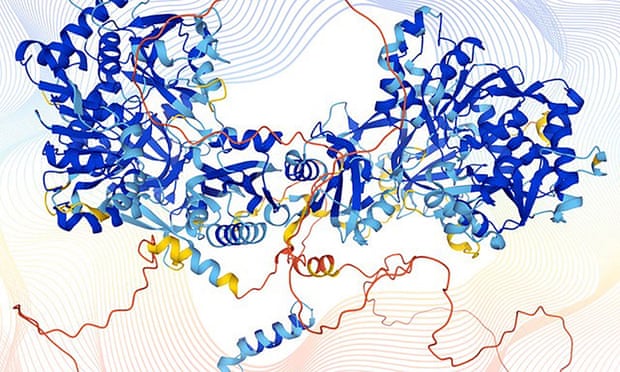DeepMind uncovers structure of 200m proteins in scientific leap forward
Success of AlphaFold program could have huge impact on global problems such as famine and disease

Artificial intelligence has deciphered the structure of virtually every protein known to science, paving the way for the development of new medicines or technologies to tackle global challenges such as famine or pollution.
Proteins are the building blocks of life. Formed of chains of amino acids, folded up into complex shapes, their 3D structure largely determines their function. Once you know how a protein folds up, you can start to understand how it works, and how to change its behaviour. Although DNA provides the instructions for making the chain of amino acids, predicting how they interact to form a 3D shape was more tricky and, until recently, scientists had only deciphered a fraction of the 200m or so proteins known to science.
In November 2020, the AI group DeepMind announced it had developed a program called AlphaFold that could rapidly predict this information using an algorithm. Since then, it has been crunching through the genetic codes of every organism that has had its genome sequenced, and predicting the structures of the hundreds of millions of proteins they collectively contain.
Last year, DeepMind published the protein structures for 20 species – including nearly all 20,000 proteins expressed by humans – on an open database. Now it has finished the job, and released predicted structures for more than 200m proteins.
“Essentially, you can think of it as covering the entire protein universe. It includes predictive structures for plants, bacteria, animals, and many other organisms, opening up huge new opportunities for AlphaFold to have an impact on important issues, such as sustainability, food insecurity, and neglected diseases,” said Demis Hassabis, DeepMind’s founder and chief executive.
Scientists are already using some of its earlier predictions to help develop new medicines. In May, researchers led by Prof Matthew Higgins at the University of Oxford announced they had used AlphaFold’s models to help determine the structure of a key malaria parasite protein, and work out where antibodies that could block transmission of the parasite were likely to bind.
“Previously, we’d been using a technique called protein crystallography to work out what this molecule looks like, but because it’s quite dynamic and moves around, we just couldn’t get to grips with it,” Higgins said. “When we took the AlphaFold models and combined them with this experimental evidence, suddenly it all made sense. This insight will now be used to design improved vaccines which induce the most potent transmission-blocking antibodies.
AlphaFold’s models are also being used by scientists at the University of Portsmouth’s Centre for Enzyme Innovation, to identify enzymes from the natural world that could be tweaked to digest and recycle plastics. “It took us quite a long time to go through this massive database of structures, but opened this whole array of new three-dimensional shapes we’d never seen before that could actually break down plastics,” said Prof John McGeehan, who is leading the work. “There’s a complete paradigm shift. We can really accelerate where we go from here – and that helps us direct these precious resources to the stuff that matters.”
Prof Dame Janet Thornton, the group leader and senior scientist at the European Molecular Biology Laboratory’s European Bioinformatics Institute, said: “AlphaFold protein structure predictions are already being used in a myriad of ways. I expect that this latest update will trigger an avalanche of new and exciting discoveries in the months and years ahead, and this is all thanks to the fact that the data are available openly for all to use.”
Geen opmerkingen:
Een reactie posten
Opmerking: Alleen leden van deze blog kunnen een reactie posten.